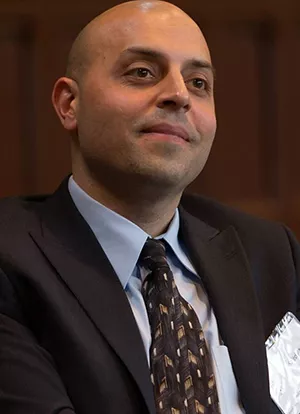Sa’ed Atshan ’06 Explores Communities, Conflict, and Responsibility

Assistant Professor of Peace & Conflict Studies Sa’ed Atshan ’06 is an anthropologist and peace and conflict studies scholar whose research focuses on contemporary Palestinian society and politics, global LGBTQ+ social movements, and Quaker studies and Christian minorities in the Middle East.
The moral responsibility that the German state and society have toward Israelis and Palestinians in Germany today is the primary focus of Atshan’s latest book, The Moral Triangle: Germans, Israelis, Palestinians (Duke University Press, 2020), co-authored with German-Israeli scholar Katharina Galor, the Hirschfeld Visiting Associate Professor at the Program in Judaic Studies at Brown University. It is one of two books that Atshan has published this year, following Queer Palestine and the Empire of Critique (Stanford University Press, 2020), which he recently discussed with Gay City News.
The Moral Triangle, an anthropological and ethnographically based project, reveals that although Berlin helps to further possibilities for German-Israeli reconciliation and even Israeli-Palestinian reconciliation, much remains to be done to promote German-Palestinian understanding.
What were the central themes for The Moral Triangle to investigate?
Our book explores the relationship among Germans, Israelis, and Palestinians in contemporary Berlin. We are primarily interested in questions surrounding the moral responsibility that the German state and society have toward Israelis and Palestinians in Germany today, in light of key historical events and present realities.
What were the circumstances that led you to meet your co-author Katharina Galor, and how did you come to the decision to write the book together?
Katharina is a professor in the Judaic Studies program at Brown University. I spent two years as a postdoctoral fellow at Brown, and we met then in that context. We quickly became dear friends and decided to become research partners on this Germany project. Katharina is German-Israeli, and I am Palestinian, and that gave us access to communities and insights that enabled us to write the book. We worked closely together and synchronized our approaches to writing and editing, which was tremendously rewarding and enjoyable, despite the sensitivities of the issues we examined.
What were some key findings and questions that your work unearthed?
We found that there is a wide range of points of view among Germans, Israelis, and Palestinians on the question of Germany’s moral responsibility toward these communities. Germans are particularly heterogenous when it comes to these matters, with many believing in the need to support both Israelis and Palestinians, others identifying only Israelis or only Palestinians, and others who support neither population or who are apathetic or unsure.
What parallels did you find with the role of the Holocaust and the Israel-Palestinian conflict?
Recognition of the Holocaust and its legacy in Germany is palpably clear among many Germans, Israelis, and Palestinians in contemporary Berlin, given the commitment to commemorating the past and toward reparations and restorative justice that the German state has spearheaded for decades, particularly in the form of supporting the Israeli state. Yet there is not the same level of recognition of how this has impacted Palestinians who have now faced over seven decades of dispossession and an ongoing Israeli military occupation.
In what ways did you find Germany has been — or remains — engaged in shaping Israeli-Palestinian relationships?
Germany sees itself as neutral, but there is a clear privileging of support for Israelis over support for Palestinians in terms of official recognition, public discourse, allocation of resources, and extension of compassion and understanding. This is a very contentious issue in contemporary Germany.
What key truths or discoveries do you hope readers will take from this book?
We see that Berlin is a cosmopolitan, exciting city that creates spaces for pluralism and social and global consciousness. We also see that Berlin facilitates possibilities for German-Israeli reconciliation and even Israeli-Palestinian reconciliation, but much needs to be done to promote German-Palestinian understanding.
How did you conduct the research for The Moral Triangle?
This is an anthropological and ethnographically based project. We chose a diverse and representative sample of Germans, Israelis, and Palestinians in Berlin to interview in homes, cafes, restaurants, bars, and public spaces, and we engaged in participant observation in these spaces and others, including for cultural events at theaters, art galleries, film festivals, interfaith dialogue groups, and much more.
What challenges or surprises did you encounter while writing and interviewing?
It was disheartening to learn that far-right groups are now resurfacing in Germany. We had to navigate the gradual rise of populist nationalism and racism that is contributing to increased anti-Semitism, Islamophobia, and anti-Arab and anti-migrant racism, but we were comforted by the countless Germans who are resisting these forces in powerful and admirable ways.
What is the meaning of the title of the book?
Since we understand that Germans, Israelis, and Palestinians are intimately connected in a triangular relationship, and because we foreground our analysis in the examination of moral responsibility, we called this a “moral triangle” and highlighted that in the book’s title.



